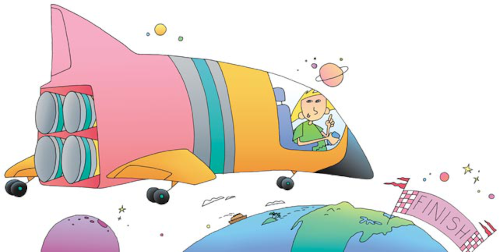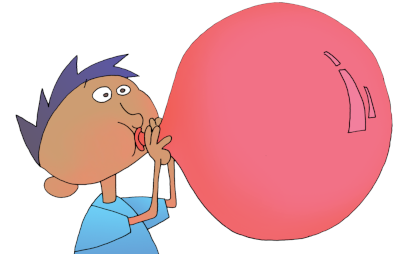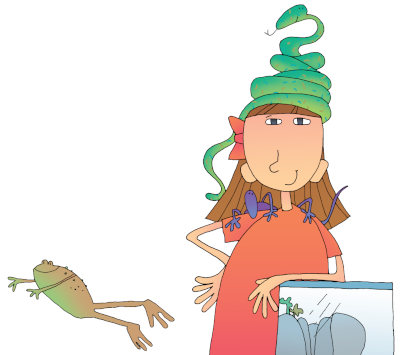WT 240
Page 240
Using Prefixes, Suffixes, Roots
You know what an astronaut is. The prefix astro means “star,” and the root naut means “sailor.” So an astronaut sails among the stars. Now, what is a cosmonaut? The prefix cosmo means “universe,” so a cosmonaut sails the universe. These words are almost the same, except that astronauts come from the United States and cosmonauts come from Russia!
Building Words from Parts
On the next nine pages, you will find a dictionary of common prefix, suffix, and root. This dictionary will help you learn vocabulary words, which you can record in your new-word notebook. (See page 235.)
A root is the main part or base of a word:
graph
A prefix comes before a root:
autograph
A suffix comes after a root:
autographed

WT 241
Page 241
Prefixes
Prefixes are word parts that come at the beginning of a word, before the root. They change the meaning of the root.
amphi (both)
amphibian (an animal both on land and in water)
anti (against)
antibody (part of the blood that works against germs)

astro (star, space)
astronaut (space traveler)
astronomy (study of stars)
auto (self)
automatic (working by itself)
bi (two)
bicycle (two-wheeled cycle)
cent (hundred)
century (100 years)
ex (out)
exit (to go out)
dis (not, opposite of)
disapprove (not approve) discovered (not covered)
hemi, semi (half)
hemisphere (half sphere) semicircle (half circle)
in (into, not)
inside (within) incomplete (not complete)
WT 242
Page 242
Prefixes (Continued)
micro (very small)
microscope (tool for looking at very small things)
mono, uni (one)
monorail (one-rail train) unique (one of a kind)
non (no, not; also see un)
nonfiction (not fictional; factual)
oct (eight)
octopus (a sea animal with eight armlike tentacles)
pre (before)
predict (to tell about something before it happens)
quad (four)
quadruped (an animal having four feet)
re (back, again)
reread (read again)

sub (under)
submarine (an underwater ship)
tri (three)
triangle (shape with three sides)
un (not; also see non)
unhealthy (not healthy)
uni (one; also see mono, uni)
WT 243
Page 243
Suffixes
Suffixes are word parts that come at the end of a word, after the root. They often change the meaning of the root.
able (can do)
changeable (can change)
ed (past tense)
learned (to learn something in the past)
er (a person who)
baker (a person who bakes)
er (more)
friendlier (more friendly)
ess (female)
lioness (a female lion)
est (most)
funniest (most funny)
ful (full)
helpful (full of help)

ing (doing something)
talking (doing what it is to talk)
ist (a person who)
pianist (a person who plays piano)
WT 244
Page 244
Suffixes (Continued))
less (without)
careless (without care)
ly (in some manner)
completely (in a complete manner)
ment (act of)
movement (the act of moving)
ology (study of)
biology (study of living things)
s, es (plural, more than one)
trees (more than one tree)

sion, tion (state of)
expansion (state of expanding)
addition (state of adding)
y (having)
rosy (having a rose color)
WT 245
Page 245
Roots
A root is the main part of a word. It helps you understand the word’s meaning. The next five pages list some common roots.
agri (field)
agriculture (growing things in fields; farming)
anni, annu (year)
anniversary (the same date on which an event happened)
biannual (twice a year)
aud (hear)
auditorium (a place to hear something)
biblio (book)
bibliography (list of books)
 © Thoughtful Learning 2025
© Thoughtful Learning 2025
bio (life)
biography (writing about a person’s life)
chron (time)
chronological (the time order in which things happened)
cycl, cyclo (wheel, circular)
bicycle (a vehicle with two wheels)
cyclone (a circular wind)
dem (people)
democracy (government by the people)
auditorium (a place to hear something)
bibliography (list of books)

biography (writing about a person’s life)
chronological (the time order in which things happened)
bicycle (a vehicle with two wheels) cyclone (a circular wind)
democracy (government by the people)
WT 246
Page 246
Roots (Continued))
dent, dont (tooth)
denture (false teeth)
orthodontist (a person who straightens teeth)
derm (skin)
dermatology (the study of skin)
dynam (power)
dynamite (powerful explosive)
equi (equal)
equinox (day and night of equal length)
flex (bend)
flexible (able to bend)

geo (earth)
geography (study of the earth)
gram (letter, writing)
telegram (a letter sent from far away)
grammar (rules for writing)
graph (write)
autograph (to write one’s own name)
hab, habit (live)
inhabit (to live in)
WT 247
Page 247
Roots (Continued)
hydr (water)
hydrant (a place where firefighters get water to fight fires)
leg (law)
legal (related to the law)

log, ology (word, study)
prologue (words that come before the main part of a book)
zoology (study of animals)
magn (great; also see mega)
magnify (to make something appear larger)
man (hand)
manicure (to groom the hands)
mar (sea)
marine (related to the sea)
max (greatest)
maximum (the greatest amount possible)
mega (great, huge; also see magn)
megaphone (instrument that makes a sound louder)
mem (remember)
memo (a note to remember something)
meter (measure)
thermometer (an instrument that measures heat)
WT 248
Page 248
Roots (Continued)
migr (move)
migrant (one who moves from one place to another)
min (small, less)
minimum (the smallest amount possible)
minus (less)
multi (many)
multicultural (including many cultures)
narr (tell)
narrative (writing that tells a story)
neg (no)
negative (meaning or saying no)
ped (foot; also see pod)
pedal (an instrument that is operated with the foot)
phon (sound)
telephone (a way sound travels)

photo (light)
photograph (a picture formed by light)
pod (foot; also see ped)
tripod (an object with three feet or legs)
port (carry)
portable (able to be carried)
WT 249
Page 249
Roots (Continued)
scope (see)
otoscope (an instrument used for seeing inside the ear)
scribe (write)
inscribe (to write or carve letters onto something)

spec (look)
inspect (to look at carefully)
sphere (ball)
spherical (having the shape of a ball)
sum (highest)
summit (the highest point, top)
tele (far)
telescope (an instrument for seeing things that are far away)
therm (heat)
thermal (related to heat)
tox (poison)
toxic (poisonous)
vid, vis (see)
video (a recording that can be seen)
supervise (to oversee, or to look over)
zo (animal)
zoology (the study of animals)
